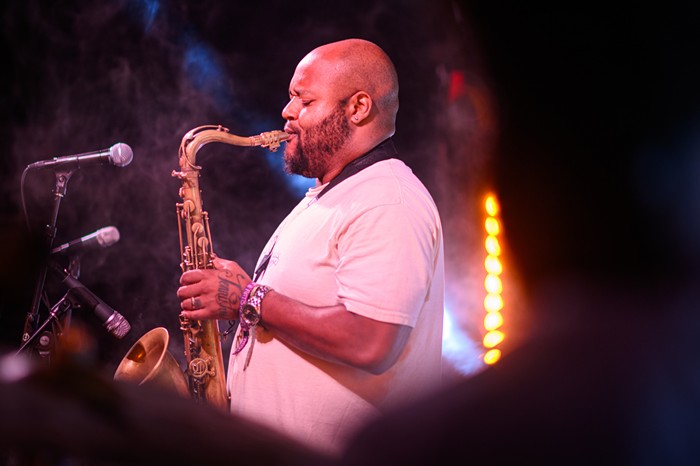It was late. We were in the car and, hoping to find a fresh pair of ears, I cranked up the new Black Mountain CD, In the Future. Immediately a voice barked from the back seat, "What is this?" And not because it wanted to know. Quickly I skipped to one of the more upbeat tracks.
"This sounds really sterile," said the other. "It's like they're playing standing still." He didn't know how right he was.
"It's a shame," I said. "Their first album wasn't like this. It's phenomenal."
That the two passengers shared my sour feelings for In the Future afforded me little solace. There was a time I saw Black Mountain as torchbearers of soulful, gritty, classic folk and rock—a necessary band to fight the drift toward the laptop-toting, knob-twisting digital wash. Unfortunately, they're no longer that band. But it wasn't the release of In the Future that did it. Things went to hell in November.
Black Mountain was playing the Doug Fir, and I couldn't wait. They'd get out there and blow the roof off the place—just go crazy. Improvise. Play loud, fast, and livid as hell—show everyone what rock 'n' roll is. Testify.
But that wasn't what happened. And that's when things began to unravel. All of a sudden that "stoner-rock" label—the one I'd protested—seemed like a snug fit. At the show, songs were carbon-copied from the albums. The tempos didn't stretch, and the energy didn't pulse. The group performed mostly still, almost lackadaisically. But the strangest part was that the band, on numerous occasions, declared Portland the best stop of their tour (in all fairness, they got a good response from the crowd). I asked keyboard player Jeremy Schmidt about the comment.
"We wouldn't have said it if we weren't feeling it," he explained. "We're not entertainers. We don't say that every night."
I asked Schmidt how this Saturday's show would be different, seeing as the band is touring on basically the same set, playing the same venue. "Gigs just really differ, just on the energy within the band, or within the audience," he explained.
And in the same way energy can shift for shows, it can for albums. Black Mountain's self-titled debut was recorded in a rather ragtag fashion. The lineup wasn't set. Parts were done here and there, and there wasn't much of a budget. But since 2005, when Black Mountain came out, a lot of things changed. The lineup is constant, resulting in more contributions from members other than guitarist/singer/songwriter Stephen McBean. Vocalist Amber Webber is getting a lot more time out front. And possibly because much of In the Future was recorded at the same studio, now the sound is polished in high gloss.
Though a few of the album's tracks are built around solid, catchy riffs, most of In the Future is a big, clunky mess. In place of loving, carefree, Stones- and Velvets-inspired tracks like "No Satisfaction," or the Zeppelin-esque "Druganaut" (from 2005's self-titled debut), rest lengthy monstrosities like "Tyrants" and "Bright Lights"; gloomy, meandering bores that rarely build or flow so much as cobble together disparate parts as congruent movements. Unfortunately, the dense fog above In the Future rarely lifts. It feels like a war album, but this time there isn't much hope.


















